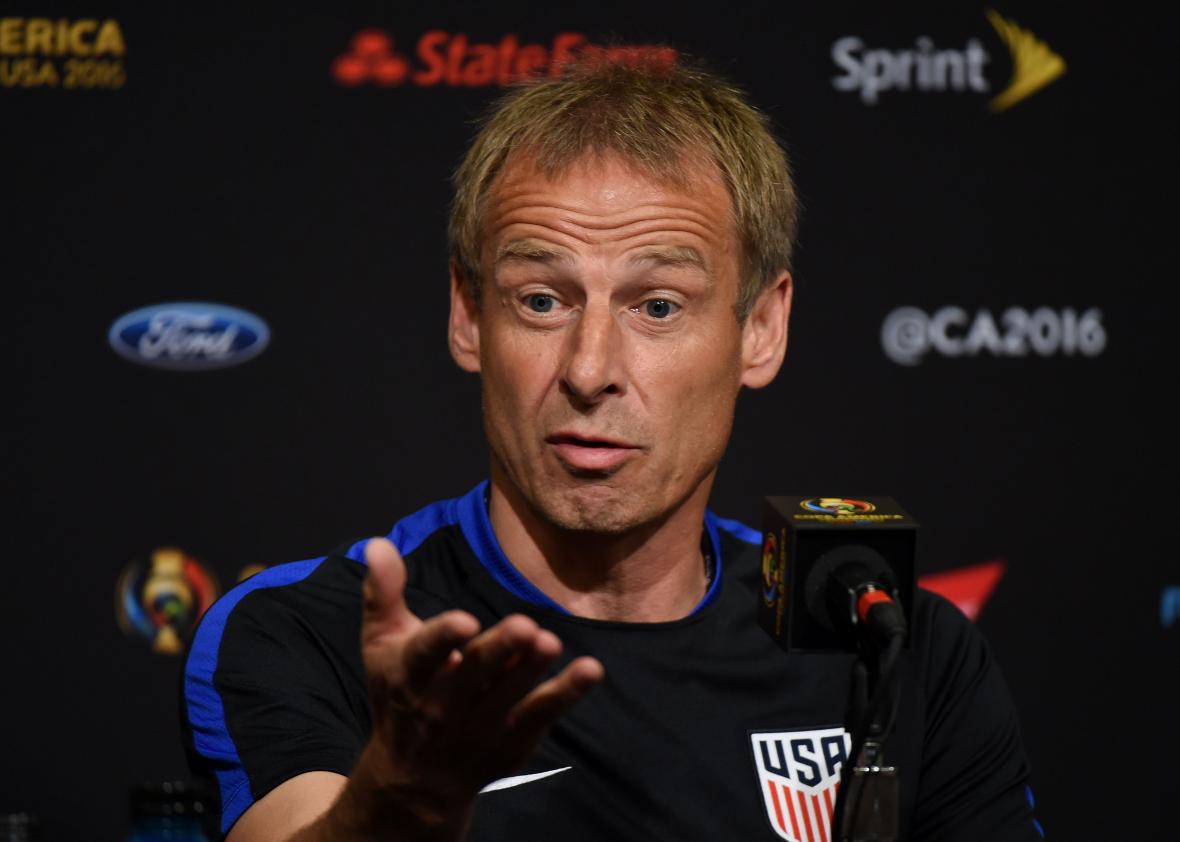Jürgen Klinsmann is at it again, tearing down his own players at the most critical of times. This round of possibly-not-so-constructive criticism came just days before the United States men’s national team was set to face Ecuador in a Copa America elimination match on Thursday. The game is a huge chance for the team to prove itself at home in a semi-major tournament after a disappointing Gold Cup run last year. The U.S. has some reasons to feel confident—they recently beat Ecuador in a pre-tournament friendly, they’re coming off two strong performances against Costa Rica and Paraguay, and they’re playing in soccer-mad Seattle, which is sure to provide an even bigger home-field advantage than the rest of the tournament already has—but the head coach was more focused on casting aspersions on his team’s “courage” on Sunday than projecting an air of optimism.
“What we would love to see is just that they become more confident and courageous to take the game to those big teams and not playing just counter-break football,” he said in Philadelphia. “Knockout stage is very mental driven. It’s when you step on the field and you see certain jerseys, it’s kind of sniffing at each other and saying: ‘I’m ready for you.’ ”
From any other coach, a comment like this could be chalked up as fairly innocuous media babble, and to some extent maybe that’s what this was. But coming from Klinsmann—who has consistently made passive-aggressive remarks challenging, doubting, or otherwise maligning his players’ commitment and mental fortitude—it’s hard to not read it as another slight. Here is a brief history of Klinnsy’s favorite “motivational technique.”
Before Copa America began in early June, Klinsmann gave an interview to the Wall Street Journal in which he called out primarily young U.S. players, some by name:
A lot of our younger players struggle to understand that it takes a lot more work and determination and aggressiveness to really make it to become a consistent, driven professional.
…
We definitely expected more youngsters to be stronger and breaking through and getting to the next level. Too many of the young players are stagnant at the moment or losing a year or two. That worries us. If it’s Rubio Rubin, or Julian Green still on the second team, or Emerson Hyndman. The years where we lose a lot of our future are between 18 and 22.
None of the players he listed made the U.S. Copa roster, but his criticism was in keeping with the former Germany striker’s past comments. After the U.S. lost to Mexico 3–2 in the CONCACAF Cup in October 2015, Klinsmann slammed Fabian Johnson for asking for a substitution in the 111th minute because the player’s muscle felt tight. Klinsmann said the defender wasn’t actually injured.
I had a very severe word with Fabian Johnson, and I sent him home today. He said he couldn’t go anymore and I reacted to it and obviously made the substitution. But he just feared to get possibly an injury, but he was not injured in that moment. He got all stiffened up. It’s a muscle issue. That’s normal. In a situation like that, little things often make a difference.
In January 2015, his players’ fitness was again the problem. Klinsmann said this after the United States, a famously fit and physical team, lost a friendly to Chile 3–2:
It kind of confirms what we feel … that after minute 60-65, you could see, the players had very heavy legs. … [T]he key moment was on the fitness side.
In 2014, when Clint Dempsey and Michael Bradley moved to Major League Soccer from European clubs, Klinsmann was not pleased and questioned their dedication.
There’s nothing I can do about it. I made it clear with Clint’s move back and Michael’s move back that it’s going to be very difficult to keep the same level that they experienced at the places where they were. It’s just reality. It’s just being honest.
When Klinsmann famously left all-time leading scorer Landon Donovan off the 2014 World Cup roster because Donovan took a three-month hiatus from soccer, he said he wouldn’t build his roster “based on the past.”
I always, I believe, am straightforward with him. Since he took his break, I simply told him if you take a break like that then you have to fight your way back into the picture and you have to confirm it with week-in, week-out performances in your club team and you have to confirm it also with performances in the national team environment.
In a 2014 New Yorker profile that was published just before the World Cup, Klinsmann characterized the American squad as reactive, while explaining his grand philosophy for U.S. soccer:
“It has to be our goal to develop a style in which Americans will recognize themselves,” he says. “They have to be in front of the television and say, ‘Yes, that’s my team.’ ” … Klinsmann believes that the team’s playing style will eventually resemble something like the country’s assertive entrepreneurial culture. “Americans are proactive,” he tells me. “You want to be world leaders in everything you do. So, on the field, you shouldn’t just sit back and wait.”
At the time, Slate called his vision “noble and overly ambitious.” Two years later, Klinsmann is still consistently bashing his players as part of an apparent motivational strategy. (In the New Yorker article, he said, “Pressure is definitely a good thing. It keeps you on your toes.”). Thursday’s Copa performance could go a ways toward determining whether his criticism and pressure are keeping players on their toes, or keeping them down.
Read more Slate coverage of Euro 2016 and Copa America.
